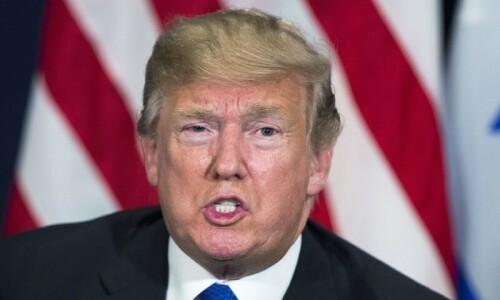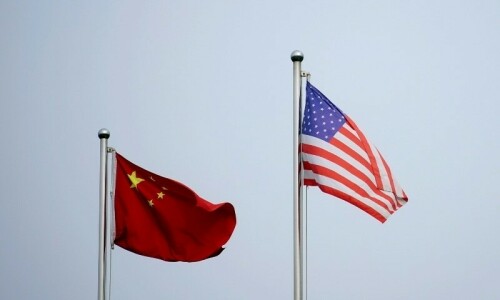Jacob Zuma, the leader of South Africa’s African National Congress, is in the United States this week to meet Secretary of State Condoleezza Rice and others. He arrives having just won a political battle that led to former President Thabo Mbeki’s downfall and to the near-certainty of Zuma becoming the country’s president next year.
How different things are today from that morning almost exactly 18 years ago, when tens of thousands of Americans lined the streets of New York to greet Nelson Mandela and his wife, Winnie, on a triumphant victory parade – when Mandela’s ANC was a moral beacon that inspired ordinary people all over the world.
Now, as the 90-year-old Mandela recedes into the twilight, his country is just another troubled developing democracy suffering from a deepening recession and a plummeting currency. Now, too, no one holds any illusions that the ANC is a cathedral of morality. Rather, it has been revealed as a rowdy town hall of competing interests, grubby with politics; a mess of factionalism, cynical self-interest and vituperative litigation. In short: a modern political party. Even Archbishop Desmond Tutu, that other icon of the struggle, has declared his disgust and said he will not vote in the upcoming elections.
The most recent evidence of all this was the ousting of Mbeki by his own party in September. Mbeki was Mandela’s de facto prime minister before he became president himself in 1999; he is responsible for the political and economic stability that characterised the last decade, even if it was accompanied by unacceptably high unemployment and crime rates and a suicidal denial of the severity of the AIDS epidemic. Mbeki, a complex and somewhat tragic figure, stood accused of not tolerating political dissent and of using the organs of the state to fight his own political battles.
One of these battles appears to have been against his deputy president, Zuma, a longtime comrade in the freedom struggle, and in government, with whom he fell out. After Zuma was implicated in a corruption case in 2005, Mbeki fired him. Zuma, who subsequently was charged, believed that there was a political conspiracy against him; in September, a judge seemed to agree and threw his case out. This gave the ANC grounds to “recall” and replace Mbeki with a caretaker president, Kgalema Motlanthe. Everyone expects that Zuma will be elected president in next year’s elections.Mbeki’s programme for the transformation of South African society was called “black economic empowerment” – aggressive affirmative action and the transfer of assets to well-connected members of the black majority. This benefited the black middle class, which grew exponentially – as did the gap between rich blacks and poor ones. Zuma, a charismatic populist, has exploited this, casting himself as the representative of all those who feel excluded from the banquet of victory.
Whereas the highly educated Mbeki is a descendant of the class of “black Englishmen” who have run the ANC since it was founded a century ago, Zuma is the unschooled rural son of a domestic worker. He is a traditionalist from the Zulu tribe, with several wives and allegedly about 20 children. When he was charged with rape last year (he was acquitted), the sexism of his defence shocked progressive South Africans, as did his willingness to let a mob of supporters run wild outside the court.
Zuma has no ideology
The architects of Zuma’s victory over Mbeki are the ANC’s left-wing allies – communists and trade unionists – who feel Mbeki betrayed the ANC’s roots with his “neo-liberal” policies of fiscal austerity and with his focus on the black middle class. Zuma has no discernible ideology – he is one of those politicians who is all things to all people – and he will go out of his way this week to tell his American hosts that South Africa’s economic policies will remain unchanged. His leftist supporters, however, see payback time: they embrace deficit spending and would like to see the nationalization of key industries. Perhaps not surprisingly, those supporters are not represented in his delegation to the United States this week.
Zuma has debts to the businessmen who have bankrolled him through his legal travails, and one of his big challenges will be to forge compromise among all the people to whom he has made promises. Already he has shown himself unequal to the task: in the interest of stability, he wanted Mbeki to see out his term, which was to have expired next April. But Zuma was overruled by his hot-headed supporters.
As Zuma feared might happen, a group of dissatisfied ANC members has emerged in the wake of Mbeki’s removal, providing the first real threat to the party since it came to power in 1994. This group is made up of senior ANC leaders who support Mbeki and who claim that the party under Zuma has deviated from its roots. They will hold a “national convention” in two weeks, and they plan to form a political party to contest the ANC in the upcoming elections.
On the one hand, this is a very positive development: the prospect of a black-led opposition to the ANC and the end of the kind of de facto, one-party state that has been the graveyard of democracy in Africa. But there is no indication yet of any significant policy contention. It all seems to be about personality and access to power.
Just after he was elected president, Mbeki visited the United States and presciently flew to Austin, Texas, to pay his respects to the then-governor. It paid off: Mbeki became George W. Bush’s “point man” – as Bush put it – in Africa.
Is Zuma hoping to play a similar role? In the unlikely event that he meets with Barack Obama, one would hope that the Democratic candidate would interrogate his visitor about something he knows only too well, from his own father’s experiences in Kenya: that patronage governs politics to an extremely unhealthy degree in Africa, and that government corruption is inevitable.
Obama might also ask Zuma whether South Africa runs the risk of becoming another Zimbabwe. If Zuma’s on the ball, he will respond that the advent of a new political party made up of his former comrades, although a threat to his untrammelled power, is the best insurance against such a possibility.
Although Zuma has permitted some troubling demagoguery from his supporters, there is no evidence that he has authoritarian tendencies himself. And even if he does, these will be kept in check by South Africa’s robust civil society and high political literacy. Certainly there is an atavistic passion for a “chief” who finds expression in the personality cult around him. But there is a stronger hunger for accountability: A society that fought so hard and sacrificed so much is not going to let democracy slip from its grasp.—Dawn/LA Times-Washington Post News Service














































Dear visitor, the comments section is undergoing an overhaul and will return soon.